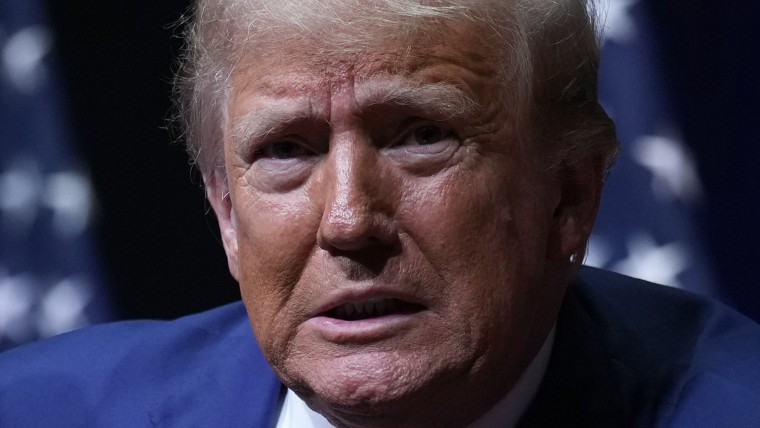In modern American politics, officeholders and candidates in both parties have tended to treat the U.S. military with reverential respect. It’s partly what makes Donald Trump’s antics over the last decade so extraordinary: Common sense suggests any politician who disparages those in uniform with such regular derision and contempt would face a swift and career-ending political backlash.
The former Republican president, however, has paid no price whatsoever — which, not surprisingly, has had the predictable effect of encouraging more of the misbehavior.
In his striking new piece, The Atlantic’s Jeffrey Goldberg summarized the matter this way:
I’ve been interested in Trump’s understanding of military affairs for nearly a decade. ... [I]n part my interest grew from the absolute novelty of Trump’s thinking. This country had never seen, to the best of my knowledge, a national political figure who insulted veterans, wounded warriors, and the fallen with metronomic regularity.
Quite right. If the conversation were limited to a small handful of easily forgotten gaffes, it’d be far less interesting. But Trump’s career in politics has been defined in part by his criticisms of those who wear (or who’ve worn) the uniform.
Goldberg’s piece, for example, highlights an incident in which Trump, during his White House term, offered to personally pay for the funeral services for Vanessa Guillén, a 20-year-old Army private who was killed by a fellow soldier at Fort Hood. The family took the then-president up on his offer and sent Trump a bill. Guillén’s funeral cost $60,000.
“It doesn’t cost 60,000 bucks to bury a f---ing Mexican!” he reportedly told his team, adding that he no longer wanted to cover the costs. The family attorney told The Atlantic that “no money was ever received by the family from Trump.”
It is, to be sure, a striking story. But I wouldn’t go so far as to describe it as surprising.
Soon after Goldberg’s piece reached the public, The New York Times published a report on new comments from former White House chief of staff John Kelly, a retired four-star general.
Confirming a statement he gave to CNN last year, Mr. Kelly said that on multiple occasions Mr. Trump told him that those Americans wounded, captured or killed in action were “losers and suckers.” ... Mr. Kelly said that on top of saying “losers” and “suckers,” Mr. Trump often questioned the decisions by Americans to sacrifice for their country. At Arlington National Cemetery on Memorial Day 2017, Mr. Trump toured the section where recently killed service members are buried, including Mr. Kelly’s son Robert, a Marine who was killed in 2010 while fighting in Afghanistan. While walking through the cemetery, Mr. Kelly recounted, Mr. Trump asked what had been in it for those who had given their lives.
“And I thought he was asking one of these rhetorical kind of, you know, questions,” Kelly told the newspaper. “But I didn’t realize he was serious — he just didn’t see what the point was. As I got to know him, again, this selflessness is something he just didn’t understand. What’s in it for them?”
Trump and his team have denounced Kelly and denied the accuracy of the latest reporting, though it is incredibly easy to believe.
It was earlier this month when Trump said during an interview, in reference to the nation’s status quo, “The military is bad. We have generals that do such a bad job.” In the same interview, the GOP nominee went on complain that U.S. military leaders “never get fired.”
Around the same time, he downplayed the importance of American troops who suffered traumatic brain injuries during an Iran-backed attack.
Six weeks earlier, the former president, hoping to impress a party megadonor, also downplayed the significance of the Medal of Honor — comments the Veterans of Foreign Wars described as “asinine” — before sparking a related controversy with a political appearance at Arlington National Cemetery.
As regular readers know, Trump has also reportedly disparaged wounded veterans, blamed military leaders for failed missions he approved, feuded with Gold Star families, and famously declared in reference to American prisoners of war, “I like people that weren’t captured, okay?”
Two weeks ago, the Republican went so far as to promise to establish a task force that would help keep military leaders out of the Pentagon if he deemed them ideologically unacceptable.
It’s hardly hyperbolic to see Trump as the nation’s first modern presidential hopeful who’s demonstrated overt hostility toward the armed forces.
It’s probably worth re-emphasizing that the GOP candidate, who relied on alleged “bone spurs” to dodge the draft, isn’t required to respect military service. If he wants to disparage those who wear the uniform or denigrate their sacrifices, I find it bizarre, but that’s his business. It’s a free country — so free that he can take rhetorical shots at the military if he wants to.
In the United States, even presidents, former presidents, and presidential candidates can insult servicemembers and veterans if they so choose.
But the next time Trump hugs a flag or touts his “pro-military” bona fides, it’s worth keeping his actual record in mind.
This post updates our related earlier coverage.
